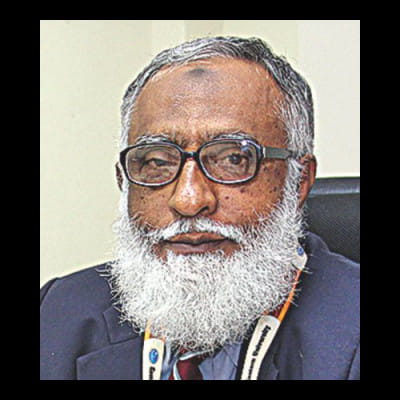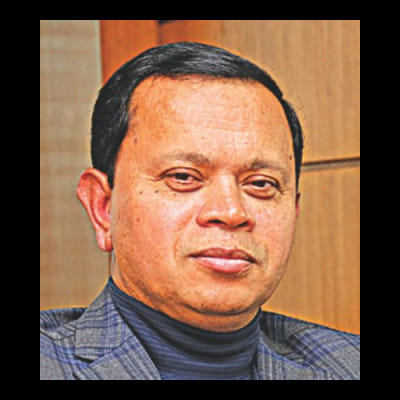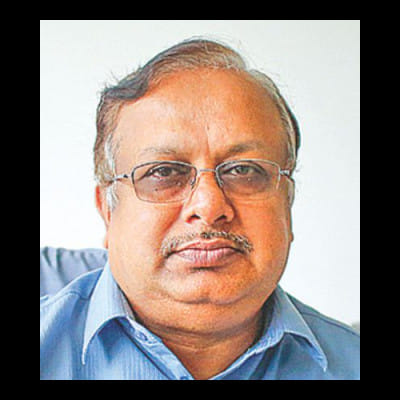Walk the talk with Vice Chancellors
What makes a graduate stand out among a large pool of qualified candidates in the job market? What is it that potentially differentiates a candidate from another during the application process? What are the possible qualities recruiters look for when it comes to hiring an employee?
Some obvious questions pop up in mind when you look for a job of your interest. If you want to excel in a career you are dreaming of, you should know where you stand, and find a way to improve the areas you are struggling in.
With this in mind, five vice chancellors and a chairman from six private universities share their thoughts on the importance of having a good skill set for pursuing a successful career and how their universities are contributing in this regard.

'Tutorial-based education can increase industry-based knowledge'
Professor Dr Mohammad Mahfuzul Islam, Vice Chancellor, Canadian University of Bangladesh
We are now living in an age where information and communication technology dominates the world. The textual learnings that we derive from books provide us with very limited scope to prosper in practical settings. For instance, students in the marketing department learn several concepts on marketing strategies. But little do they apply those concepts in the practical field as all kinds of marketing operations are conducted through the online communication system, which is not included in their syllabus. For this reason, we need more practical skills to cope with the changes at this age.
Our university has a unique approach to enhance the basic skills of the students alongside the regular curricula. We have incorporated a tutorial-based education approach in our system where students get to solve several industrial case studies after attending the regular theoretical lectures. Though it requires a lot of effort to run this system, our faculties are pulling it off and teaching our students about the real-life implications of the theories they are studying. We have also developed two technological tools to develop the skills of both teachers and students. The University Management System (UMS) deals with the strategic functions and operations of our institutions and the other software Moodle deals with the academic activities. Apart from that, we have eight clubs in our facilities to develop leadership skills of the students.
The number of universities is increasing, but most of these universities compromise on qualities. Since they focus only on the commercial side of their institutions, they do not recruit instructors with the required qualities. As a result, the graduates from these institutions do not receive much practical knowledge from faculties and cannot match the needs of different industries. When these graduates go to the industrial field, they cannot offer innovative ideas to run the industries. Consequentially, these industries fail to increase their capacity to create more job opportunities.
In order to cope with the contemporary world, we need to restructure our curricula. Also, we have to recruit quality instructors so that they can teach students about industry-based knowledge. Theory-based education and skill-based programmes should go hand in hand to produce the best graduates in the market.

'English communication skills can help a student excel in the market'
Professor Dr ANM Meshquat Uddin, Vice Chancellor, Southeast University
The ability to communicate in English is very important in the contemporary world. Students should have a good command over this language. Besides, ethics and manners, leadership quality and team management, which are often termed as “soft skills”, are equally important for students to increase their capabilities. The textual knowledge that we get from books is of minimal help to build this skill set. Every student should work hard in their own capacity to acquire these skills.
We have a career professional service department which focuses on skill enhancement and professional development of our students. This department regularly arranges training programmes for students where nationally and internationally recognised professionals come to run the sessions. Another activity of the department is to prepare the students for internship placement. We have allocated a large portion of our budget for this department. Besides, we have various clubs which help discover the potential of students. Our activities in the debating, computer, social skill, games and sports, and cultural clubs help the students engage in extracurricular activities besides academic programmes.
We believe the skills of a faculty are equally important. For this reason, we have established the Institute of Research and Training which provides funds for the faculties, aiming to conduct constructive research studies.
Most universities do not offer work-oriented education; as a result, the number of unemployed graduates increases every year. The curriculum of the university has to be restructured to facilitate skill-based learning. Moreover, every university should arrange a regular dialogue with the stakeholders such as employers, alumni, parents, university grant commission, etc., so that the university authorities can understand the expectations and demands of these relevant bodies. Besides, a good university should analyse the demands for jobs in several sectors and turn their students into competent human resources. Also, universities should offer well-structured post-graduation programmes which will enable students to learn research-based advanced courses.

'Quality education can create the path to success'
Professor Dr Aminul Hoque, Vice Chancellor, Eastern University
Adopting the latest technology in their own domain should be the first priority of a student. After completing their bachelor's degree, graduates should take special training related to their degrees to meet the demands of the employers. Regarding this, the faculties can provide them with the basic guidelines to take necessary courses of their interest at the final year of university. If a student maps out their own career goals and adopts necessary measures accordingly, that particular student will not remain unemployed after the successful completion of their degree.
The universities should not only adopt technology for skills improvement but also provide the platform to make the best use of it.
Also, students should expand their knowledge and master the art of expressing self-worth.
Moral learning and ethics are equally important to adjust to the system they are going to work in. Besides, universities should offer post-graduation degrees in respective fields. Having a post-graduation degree will enable the students to have proper insight of the practical world.
Bachelor's degrees are based on theoretical learning mostly, while master's degrees offer students an opportunity to gain practical knowledge in their immediate vicinity.
We emphasise on the adoption of the latest technology to enrich the skill sets of a student. We invite prominent figures from different information technology companies who enlighten our students about the practical settings so that they can have a deeper understanding of the current market demand. We mould the self-worth of each student and shape them to enable them to reach the highest level of success. Our goal reflects best in our motto which is “Quality Education: Success in Career”. We believe quality is essential to achieve success no matter which degree you are pursuing. This is how our system works to discover the potential of a student.

'Universities should restructure their curricula'
Md Sabur Khan, Chairman, Daffodil International University
Defining skill matrix is essential to understand the competency and skill level of every student in the contemporary world. If we look at the current status of the market, we can see that the market has become more competitive than ever before. Specific skill orientation and technology adoption can be of good help to excel in the market. The secret recipe to unlock success in career is to adopt the latest technology from own domains, which provides a platform to improve skill-oriented knowledge.
Our university has taken some major steps to enhance the skill sets of students. Firstly, we provide free laptops to our students in order to make them technologically advanced. Secondly, we have introduced 46 modules, all of which are technologically operated. Thirdly, we introduced a course called Employability 360 to identify the potential of a student. We have taken different steps under this course to increase their competency. For instance, this course instructs the students to create their own video resumes in order to represent them best in the competitive market. We have also launched a three-credit course titled Art of Living, the focus of which is to raise the moral values of the students besides skill development. This value generation approach creates an amicable agreement and minimises the distance between students and their parents.
Finally, we are reconstructing our entrepreneurship department to assist the students who aspire to become entrepreneurs. We launch start-up markets in our campus every week for emerging entrepreneurs. Not only have we supported them with incentives like business incubators, but also provided them with guidelines in the form of free books of over 3,500 copies on entrepreneurship.
Our attempt to facilitate international mobility is reflected best in the exchange programmes we are arranging with different institutions around the world. Apart from that, we have initiated a new scholarship programme called Earn While You Learn through which students can avail themselves of the opportunity to earn money by attending on-campus jobs.
Universities should restructure their curricula in such a way that supports the skill-oriented development of a student. The authorities should integrate the students in the system according to their skills and aspirations.

'Outcome-based education is needed to assess the employability of graduates'
Professor Dr Chowdhury Mofizur Rahman, Vice Chancellor, United International University
First and foremost, students need to acquire state-of-the-art knowledge of the subject they are studying. They should be able to solve the practical problems around them with their academic excellence. Strong inclination to learning and soft skills acquisition are of paramount importance to stand out in this globalised world.
The traditional curriculum of universities should be replaced with outcome-based education (OBE). OBE measures the learning outcome of each course of the curriculum and assesses the employability of graduates. Evaluation process must be revised to induce problem-solving skills of students. Presentation sessions and term paper submissions can add value to their skills as well.
We have introduced intensive English language courses in the first two trimesters of every academic programme. In the very first trimester, we teach our students about life skills which motivates them to study methodically and encourages them to be responsible and successful citizens in life. Our aim is to integrate OBE-based teaching and learning process in our system. Moreover, we engage industry professionals to teach some courses in the final year so that students can derive industry-oriented knowledge before graduation.

'University curriculum should meet demand of the industries'
Professor HM Jahirul Haque, Vice Chancellor, University of Liberal Arts Bangladesh (ULAB)
Communication skills with emphasis on English and Bengali languages, team management skills and IT skills are very important to thrive in future career and life. Additionally, positive attitude and punctuality are two fundamental traits that a student must have to become a successful person.
University authorities should build a system through which they can nurture the skills of students for ensuring a better career. The curriculum of the universities should be restructured in order to meet the demand of the industry. Moreover, career counselling services and extracurricular units can help students choose the jobs best suited for them.
At the orientation programme, we enlighten our students about the importance of acquiring soft skills to secure a bright future. Our associate professors run a co-curricular office to conduct all types of co-curricular and extracurricular activities. We highly encourage our students to get associated with at least two clubs among the 20 different clubs of ULAB.
We provide the opportunity for students to win the prestigious Duke of Edinburgh's Award which encourages them to get involved in extracurricular activities. Besides, we regularly organise industrial visits, field trips and study tours both at national and international level to enhance the skills of our students.

 For all latest news, follow The Daily Star's Google News channel.
For all latest news, follow The Daily Star's Google News channel. 



Comments